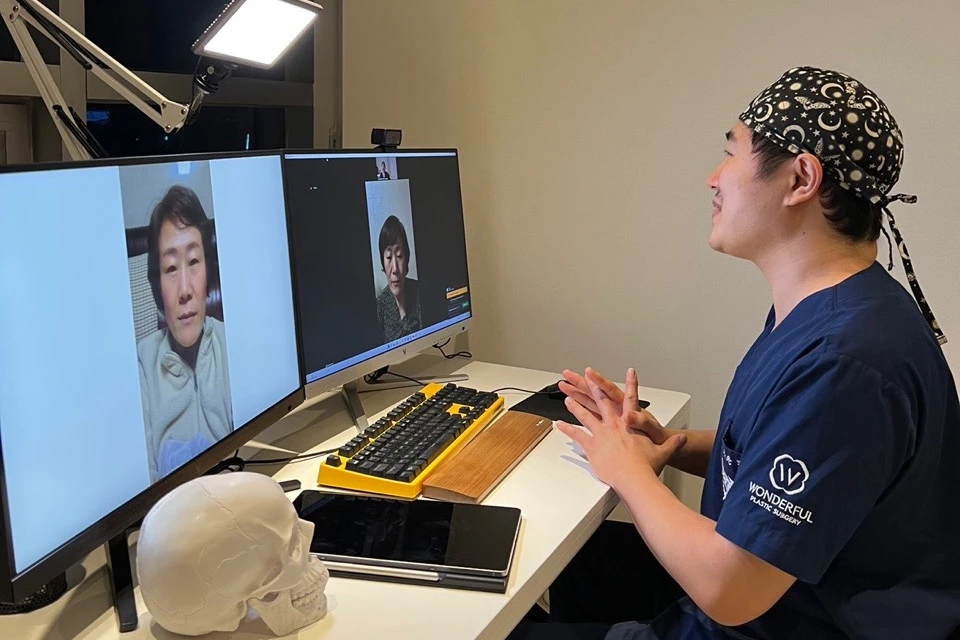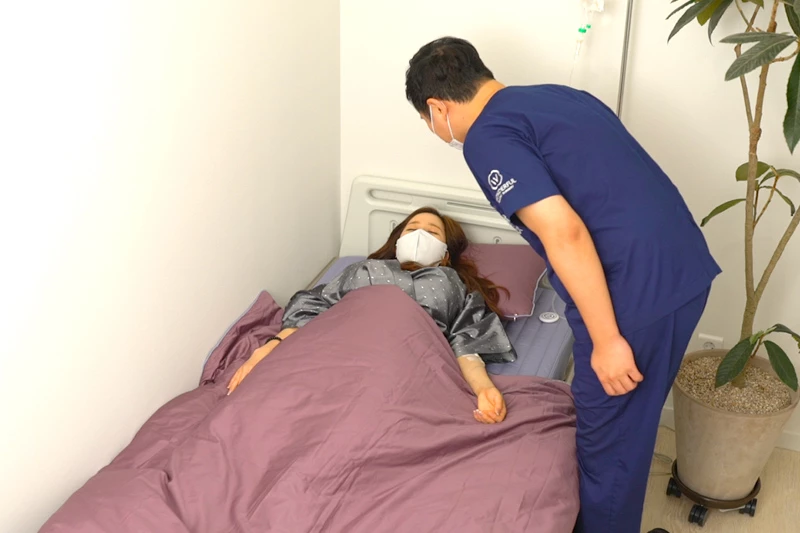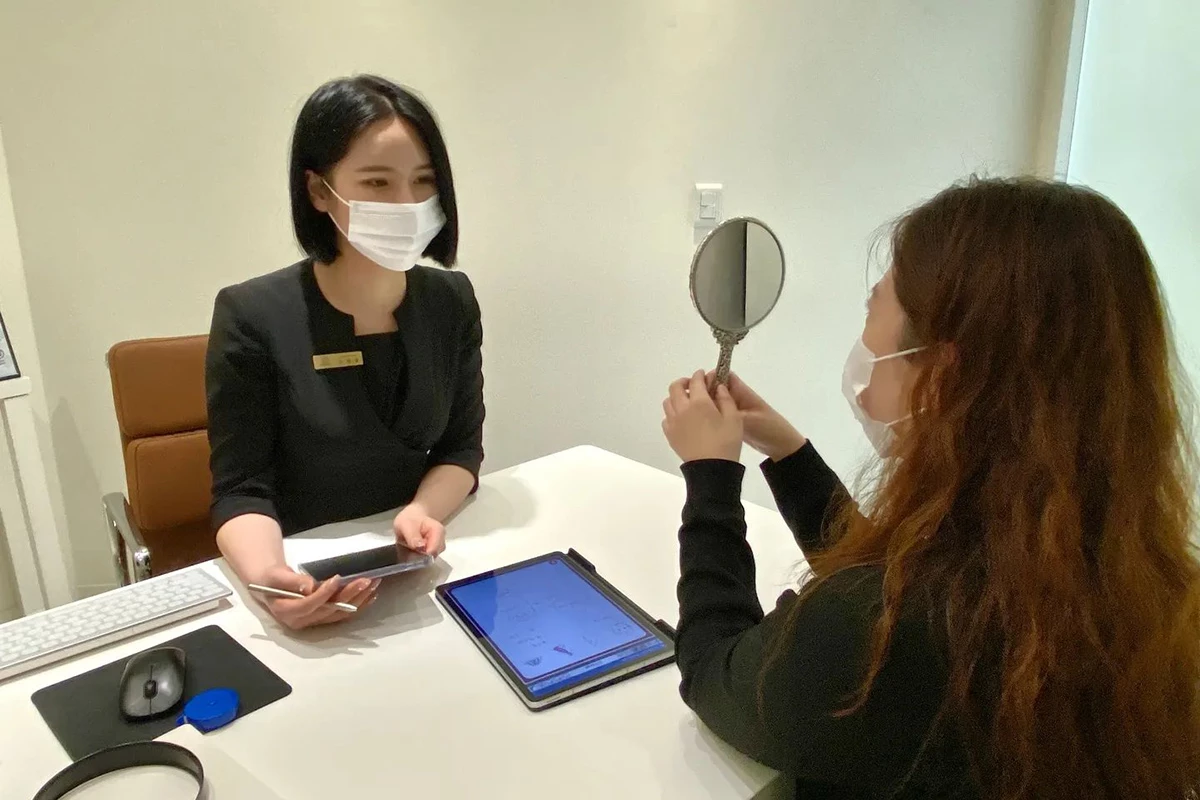Wonderful’s Care Program
Our systematic and high-quality premium care helps you for a quick recovery.
Wonderful After Care Program
Wonderful Plastic Surgery helps patients to speed up recovery through regular feedback from the medical staff and continuous management of the dedicated management department.

Hotel Partners
Providing hotel-linked services to customers from abroad.

Follow-up online consultation
Stay connected with your doctors at Wonderful and receive personalized post-operative care guidance from the comfort of your home in your own country.

Complimentary Treatments
From healing light to radiofrequency care to ultrasound care, we provide various stages of post-operative care for healing and improved softness.

International Service
Various foreign languages such as English, Chinese, Japanese, Thai, Indonesian, and Vietnamese are available.

Airport Transfers
Limousine taxis are provided so that you can return home safely after surgery.
Wonderful Before & After Surgery
Please follow Wonderful precautions (Before & After) surgery for safe surgery and high quality results.
Before Surgery Precautions
Medication
Avoid using birth control pills, hormones, vitamin E, or aspirin for one week before surgery.
Medical History
Please notify the hospital ahead of time if you are being treated for high blood pressure, heart disease, diabetes, or thyroid problems.
If you anticipate having a severe cold or experiencing issues with your airways or respiratory system on the day of the appointment, kindly let us know in advance.
Please let us know ahead of time if you will have a bad cold or have abnormalities with your respiratory system or airways on the day of operation.
Meal
Refrain from eating and drinking for 8 hours prior to surgery.
Smoking and Drinking
Please refrain from smoking and drinking alcohol for 3 days before surgery.
Clothes
Please wear loose-fitting clothes that you feel comfortable in. Masks, scarf, hats, sunglasses etc are also suggested.
Additional Info
To proceed with the surgery smoothly as possible, please remove contact lenses, jewelry, accessories, nail polish, and makeup in advance on the day of surgery.
Please also keep in mind that it may be difficult to drive after surgery.
Plastic surgery results may vary depending on the individual, and side effects such as inflammation, bleeding, and nerve damage are possible, so please exercise caution.
After Surgery Precautions
Eye
Nose
Breast
Lifting
Liposuction
Hair Transplant
Eye Surgery Aftercare
Swelling
Bruising or swelling may increase 2-3 days after surgery, and there are individual differences.
There is large swelling for 1 to 2 weeks after surgery, and the remaining swelling gradually decreases within 1 week to 1 month.
Symptoms and Pain
Immediately following under-opening surgery or sub-eye fat repositioning, bloody tears may occasionally flow after mingling with tears for about a week.
After surgery, mucosal edema could take 1 to 2 weeks to appear. To avoid dryness, use artificial tears or prescription eye drops.
Medication
Avoid aspirin/vitamin E type drugs for 1 week after surgery.
Wash Face/ Make Up
After the stitches are removed, eye makeup can be worn, and lenses can be worn 2-3 weeks later, depending on the healing process.
You can wash your face while avoiding the surgical site.
Sleeping Position
At bedtime, keep your head elevated above your heart and maintain a frontal position.
Smoking/Alcohol/Sauna/Exercise
Alcohol and smoking are prohibited for at least 1 month after surgery.
Jjimjilbang, sauna, swimming pool, excessive exercise, and massage are possible after about 1 to 2 months.
Self-Care
After surgery, please apply cold compresses for 3 days.
Extra Precautions
For three to seven days after surgery, avoid coming into direct contact with water.
Apply the recommended ointment and gently wipe it down with a cotton swab if it comes in touch with water.
Emergency
In the event of an emergency such as extreme pain or severe swelling, please contact the hospital immediately and visit us.
Plastic surgery results may vary depending on the individual, and side effects such as inflammation, bleeding, and nerve damage may occur, so caution is required.
Nose Surgery Aftercare
Swelling
Bruising or swelling may get worse for some people 2-3 days following surgery, depending on the patient.
After surgery, there may be swelling for 1 to 2 weeks and it progressively goes away after 1 to 2 weeks.
Symptoms and Pain
General anesthesia patients may have nausea or vomiting as well as a minor fever for one to two days following surgery.
After surgery, there may be some pain for a couple of days, but it will be managed with medications in accordance with the doctor’s recommendations.
Medication
Avoid aspirin/vitamin E type drugs for 1 week after surgery.
Wash Face/ Make Up
You can wash your face while avoiding the area where the tape is pasted.
Sleeping Posture
At bedtime, keep your head elevated above your heart and maintain a frontal position.
Smoking/Alcohol/Sauna/Exercise
Alcohol and smoking are prohibited for at least 1 month after surgery.
Jjimjilbang, sauna, swimming pool, excessive exercise, and massage are possible after about 1 to 2 months.
Self-Care
Please use cold compresses for three days following surgery. (Apply the poultice to the forehead and nose.)
Blowing your nose is possible after one month.
Allow any blood or fluids to flow naturally before using a tissue or piece of gauze to gently clean the area without touching the incision. Never touch your nose.
Extra Precautions
For a month, refrain from wearing anything that will press against your nose, including glasses or sunglasses.
Refrain from picking or digging your nose. (Blood may flow from the nose.)
Emergency
In the event of an emergency such as extreme pain or severe swelling, please contact the hospital immediately and visit us.
Plastic surgery results may vary depending on the individual, and side effects such as inflammation, bleeding, and nerve damage may occur, so caution is required.
Breast Surgery Aftercare
Swelling
Swelling can range in intensity and differ from person to person.
After surgery, there may be significant swelling for 1 to 2 weeks, which progressively subsides over the course of about 1 month.
Following surgery, the breasts’ surrounding tissue may swell, which could give the impression that they are smaller or more spread out. (The swelling will gradually subside, leaving you with a lovely breast shape.)
Pain
Following surgery, chest pain usually peaks one to two days later.
After surgery, pain and throbbing may last for between 1 month to a year.
Medication
Spheroidal contractile medications should be taken for at least three months; if you plan to stop taking them before that time, please let us know when you visit the hospital.
Stop using it right once if you start to have chest palpitations or body acne. (If you have an arrhythmia, do not take.)
Period irregularities may result from hormonal changes.
For one week following surgery, avoid aspirin and vitamin E-type medications.
Meal
After surgery, you can eat, but it’s best to stick to soft foods like porridge or rice.
Sleeping Position
Keep your head elevated above your heart and maintain a frontal position.
Lying on the side is possible after 1 to 2 months, and bowing or lying down is possible after at least 5 months.
Smoking/Alcohol/Sauna/Exercise
Alcohol and smoking are prohibited for at least 1 month after surgery.
Jjimjilbang, sauna, swimming pool Excessive exercise and massage are possible after about 1 to 2 months.
Self-Care
After surgery, swelling can be reduced by applying cold compresses for three days, followed by warm compresses.
Extra Precautions
Avoid lifting anything that is too heavy or exercising your arms too much.
Emergency
In the event of an emergency such as extreme pain or severe swelling, please contact the hospital immediately and visit us.
Plastic surgery results may vary depending on the individual, and side effects such as inflammation, bleeding, and nerve damage may occur, so caution is required.
Lifting Surgery Aftercare
Swelling
Depending on the individual, bruising may appear 2-3 days after surgery and may persist for 1-2 weeks.
After surgery, there may be significant swelling for 1 to 2 weeks and it will progressively go away after 1 to 2 weeks.
The appearance of the swelling as seeming asymmetrical, with separate swellings or swellings on both sides, is a common occurrence.
Symptoms and Pain
There can be a stinging pain, but it will eventually go away with time. The forehead fixing area may be painful at first, but this is only a short term thing that progressively gets better.
Medication
Avoid aspirin/vitamin E type drugs for 1 week after surgery.
Meal
You can eat food 6 hours after surgery, and it is recommended to eat soft rice or porridge.
Sleeping Position
At bedtime, keep your head elevated above your heart and maintain a frontal position.
Smoking/Alcohol/Sauna/Exercise
Alcohol and smoking are prohibited for at least 1 month after surgery.
Jjimjilbang, sauna, swimming pool, excessive exercise, and massage are possible after about 1 to 2 months.
Self-Care
Put a cloth on your pillow as you sleep because the wound may bleed for three to five days.
After surgery, please use cold compresses for three days. Apply a compress around the eyes because the eyes usually swell more than the forehead.
Emergency
If your face is swollen due to heat, pain, or asymmetry, please visit the hospital.
In the event of an emergency such as extreme pain or severe swelling, please contact the hospital immediately and visit us.
Plastic surgery results may vary depending on the individual, and side effects such as inflammation, bleeding, and nerve damage may occur, so caution is required.
Liposuction Surgery Aftercare
Swelling
Depending on the location, the swelling will decrease by more than 70 to 80% in 3 to 4 weeks but the bruising may persist for 1 to 3 weeks.
Satisfaction begins one month after surgery, and if you continue receiving treatment for one to three months following surgery, the remaining swelling will begin to subside.
Symptoms and Pain
Occasionally, when an excessive amount is inhaled, serousoma (vesicles) may develop for a while, but for this situation, it will get better with therapy as directed by the medical personnel.
Due to the breast fat inside the liposuction site, the skin tightening is first acute and gets better over the course of three weeks to one month.
Medication
Avoid aspirin/vitamin E type drugs for 1 week after surgery.
Wash Face
Be careful not to let water come into contact with the surgical area, and you can take a shower with a waterproof band attached.
Smoking/Alcohol/Sauna/Exercise
Alcohol and smoking are prohibited for at least 1 month after surgery.
Jjimjilbang, sauna, swimming pool Excessive exercise and massage are possible after about 1 to 2 months.
Self-Care
It is recommended to use compression clothing continuously for at least one to three months.
It is advised to continue eating healthy and exercising after surgery.
Extra Precautions
Please do not remove the bandage or tape from the region where the fat was removed until specifically instructed to do so. It will be removed after you arrive at the hospital.
Emergency
In the event of an emergency such as extreme pain or severe swelling, please contact the hospital immediately and visit us.
Plastic surgery results may vary depending on the individual, and side effects such as inflammation, bleeding, and nerve damage may occur, so caution is required.
Hair Transplant Aftercare
Hair transplant surgery is a delicate procedure, and aftercare is crucial for the best possible results. Here are some precautions to take after hair transplant surgery:
Swelling
Swelling and redness around the scalp area are common after hair transplant surgery, and they usually subside within a week or two.
Pain
Pain and discomfort may occur for the first few days following surgery, and you can take pain medications as prescribed by your doctor.
Medication
You may need to take antibiotics and anti-inflammatory medications for several days after surgery to prevent infection and reduce swelling.
Meal
After surgery, it’s best to avoid spicy, acidic, or salty foods, which can irritate the scalp.
Sleeping Position
For the first few days after surgery, it’s recommended to sleep with your head elevated and avoid any pressure on the scalp. You can gradually resume your normal sleeping position after a week or two.
Smoking/Alcohol/Sauna/Exercise
Smoking and alcohol are prohibited for at least a week after surgery, as they can slow down the healing process. You should also avoid saunas, steam rooms, and intense exercise for a few weeks.
Self-Care
After surgery, avoid rubbing or scratching the scalp, and do not use any hair products or styling tools until your doctor gives you the green light. You can gently wash your hair with a mild shampoo after a few days.
Extra Precautions
Avoid direct sun exposure to the scalp for at least a month after surgery, and wear a hat or sunscreen when you go outside.
Emergency
If you experience severe pain, bleeding, or infection, contact your doctor immediately or visit the hospital for urgent care.
Hair transplant surgery can have risks and complications, including bleeding, infection, scarring, and poor hair growth, so it’s essential to follow your doctor’s instructions and take proper care of your scalp to ensure the best possible outcome.
Enhance Your Life
Recognized Worldwide

